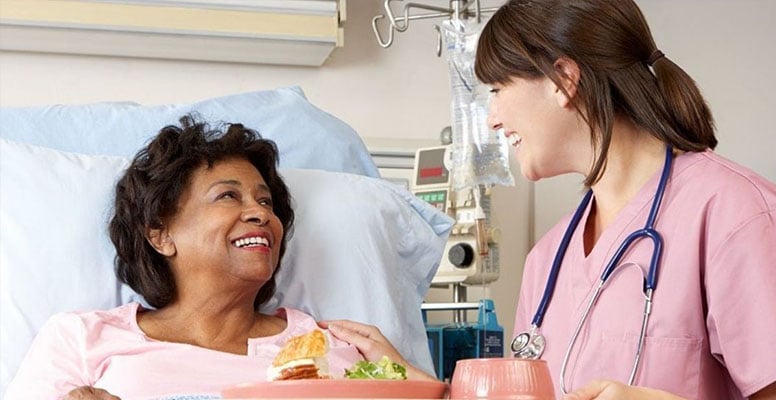12th May 2021
Andrew Pond, Business Development Director for Civica, examines the findings of the Independent Review of NHS Hospital Food in England, which details a number of recommendations to improve food safety in hospitals.
In 2018 to 2019, the NHS spent £634 million on hospital food, representing approximately 6.7% of the total costs of running the NHS estate. Clearly food is a vital cog in the NHS wheel and it is important that Trusts provide nutritious, safe, cost-effective catering operations for patients and staff.
The Independent Review of NHS Hospital Food in England, published in October 2020, is the first step towards improving standards. This 97-page document covers the safety, nutrition, quality and production methods of food for patients, staff and visitors in NHS hospitals. It was commissioned following outbreak of listeriosis in England, during which seven patients died after eating hospital sandwiches contaminated with Listeria monocytogenes.
While the review recognises the challenges to improving food culture in our hospitals, its focus is on making things better through a holistic approach. It includes a checklist for catering managers and chief executives, with 24 key points to help provide a good food service. It also makes eight recommendations for system-level change, covering everything from food standards and meal ordering systems, to food waste and governance.
At the heart of the subsequent report is the idea that appropriate nutrition and hydration is just as important for staff and visitors as it is for patients. In fact, to quote the Executive Summary: “In the best hospitals we’ve seen, the same food is served to everyone in the hospital.”
Recommendations to raise standards
At Civica we are committed to raising standards across hospital catering. We offer a portfolio of products including Civica Catering Management (formerly Saffron) and Trac to help improve efficiency, accuracy, visibility and the patient experience. With this in mind, let’s look at the eight key recommendations of the Hospital Food Review.
- Catering staff support
Clearly there are challenges in attracting and motivating chefs in healthcare and the review sets out how to enhance current structures. This includes developing a national training certificated course for hospital caterers, providing an NHS catering apprenticeship scheme, agreeing national professional standards and improving pay, recognition and in-service training opportunities for hospital chefs. We recognise the recruitment challenges faced in the NHS. Our Trac recruitment management software is used by over 180 NHS Trusts to progress vacancies and complete pre-employment checks to get the best applicants into post quicker and more efficiently than ever. - Nutrition and hydration
Recognising the clinical importance of food in hospitals by giving greater accountability for food services to ward staff. Some hospitals have introduced a food and drink steering group with representation from nursing, dietetics, catering, speech and language therapists, sustainability and staff health and well-being leads, as well as patients. This should be implemented across the board, the review says, along with a named food service dietitian in every trust, responsible for overseeing patient, staff and visitor catering. - Food safety
Purchasers must have an effective mechanism in place to assure food safety within their supplier base and drive improvements where necessary. Specific recommendations within food safety include better communication channels, the appointment of a nominated food safety specialist and a named board member responsible for the food service in each trust, together with a mandated reporting procedure for food safety concerns. The key point here is that “trusts must recognise their legal obligations as food business operators and ensure effective compliance with robust food safety procedures in place at all levels, that must be understood, enacted and verified.” - Facilities
Funding is vital and the review highlights the important for effective planning to enhance the standard of facilities for preparing, cooking and serving food. This includes central production units, main and finishing kitchens, visitor restaurants, and staff kitchens and pantries. The aim is to provide funding to enable a 24/7 service for everyone in the hospital, but if 24/7 food service is not available for staff, they must have access to appropriate facilities to safely store, prepare and eat their own meals at any time of the day or night. All new healthcare builds should prioritise providing health-enhancing, fresh and sustainable food to patients, staff and visitors. - Technology
The Hospital Food Review notes that digital solutions are helping healthcare teams to collate food choices, manage allergies and diets, and minimise waste. It recommends that every hospital should implement a digital meal ordering system, such as Civica Catering Management, by 2022. This will support safe ordering and mapping to patients’ care plans, better tailoring of meals to patients’ needs, minimum time between ordering and meal service, and an overall reduction in waste. - Enforcing standards
Ultimately, we need to raise food and drink standards for patients, staff and visitors. The recommendation is that standards are inspected by the CQC and that they apply to patient, staff and visitor food, food manufacturers, food retailers and vending machines. This includes the requirement for appropriate facilities to support patients and staff to eat well 24/7 when in the hospital environment. - Sustainability and waste
The review also highlights inconsistencies across England’s hospitals in purchasing high-quality products, understanding the role of sustainability and managing food waste. It recommends mandating a 40% cost/60% quality split across the NHS for the procurement of food and all catering services, as well as a common method of recording and monitoring food waste. - Going forward
It is also clear that processes must be put in place to demonstrate progress and change over an appropriate period of time. This includes putting in place an expert group of hospital caterers, dietitians and nurses, with input from infection prevention and control, and sustainability and staff health and well-being leads, to oversee hospital performance and progress against the recommendations.
Civica digital bedside meal ordering drives $300K savings
Saffron Bedside drives food reduction and improves patient satisfaction for Chesterfield Royal Hospital NHS Foundation Trust and Sodexo.
Read the case study